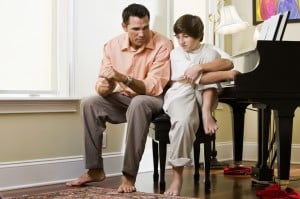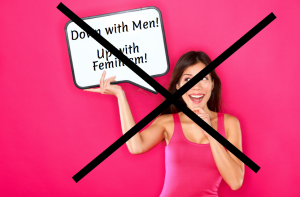
Source: NAFCL Children’s Library
My mom died of breast cancer last summer, and after her death, I discovered class notes compiled for her 25th college reunion.
She had submitted an update on her life, which talked about her career highs and lows and her relocation from New York to Vancouver.
Her update also included the line “I have been saying that when I signed on as a feminist, no one told me that my children hadn’t signed the contract, too.”
At the time, I was 17 and my brothers were 14 and 7. Two decades, two kids, and a busy job later, and I can definitely relate to that sentiment.
My mom was incredibly family-orientated – an only child herself, she married my dad who was one of five, dove into his large family, went on to have three kids of her own, and found so much delight in her grandchildren.
She was also a feminist who taught me that one of most empowering things you could do was not to wholly sacrifice yourself for family, but rather weave family into your life and weave your feminism into your family.
Like a lot of kids, I didn’t totally get this at the time.
I felt that my need for a ride somewhere or that the lack of my favorite cereal in the cupboard was just as important as the stack of papers my historian mom needed to grade or the lecture she had to finish writing – let alone the TV show she wanted to watch.
Kids often don’t get that their parents have a life and needs outside the family structure.
And that’s okay, since in many ways, it is a sign that those parents have created an environment secure enough for children to feel safe whining about things grown-ups often find trivial.
Still, it came as something of a surprise to me to realize that it is not just kids who think that when someone is a parent – particularly a mom – that aspect of their identity should subsume all others.
Apparently, this is the view that a lot of adults hold as well!
Many grown people, both parents and those who aren’t, don’t recognize that mothers can have autonomous needs outside of the house and family.
Since many aspects of feminism advocate for women’s empowerment, people tend to have this incorrect notion that being a feminist is incompatible with supporting families, let alone having one of your own.
This view is regularly reinforced by a lot of tired stereotypes and mistaken beliefs.
Here are five of the most common.
Myth 1. Feminists Are Uninterested in Parenting
Studies have found that feminists are generally seen as career-oriented, man-hating, and uninterested in family or parenting.
However, far from being anti-family, it is often feminists who are at the forefront of fighting for pro-family policies like parental leave, daycare expansions, and flexible job sharing.
That’s true whether they want, or have, kids of their own.
And it isn’t just that feminists support policy change which strengthen families. A study published in the Journal of Women Quarterly found that feminist beliefs were higher among women who hoped to be mothers than among those who didn’t.
Why is that?
It might actually be the case that feminism allows women to view family more positively because feminists see that having kids doesn’t have to mean trading in their career or being stuck in traditional roles at home.
Indeed, when I dithered about taking a new job that was to start a month after my first child was due, it was my mom who urged me to accept it.
She reminded me that while it might be hard in the beginning, she didn’t think that, even if it had been an option, I would be happy as a full time stay at home parent, and that whatever maternity leave I’d get from my current job wasn’t worth the long term career advances this new position offered.
So I took the job, started with a newborn, and now, almost a decade later can confidently say she was right.
Myth 2. Feminists Hate Men
Though the feminist man-hater trope is as old as the movement itself, it still seems to wield a lot of power, and it is trotted out again and again as proof that feminists are angry, divisive, and want to break down families.
In her article on this site, Erin Tatum explains that despite what a lot of people think, being against sexism is not the same thing as being against men.
As she writes, “Women don’t view sexism as an opportunity to scheme flipping the system to make men the victims. They want to eradicate sexism to ensure that everyone has the right to express gender however they want.”
In reality, it isn’t men that feminists hate, but rather the underlying systems that produce male privilege.
Claiming that feminists hate men is an effective way to push a lot of women away from the movement and back into someone else’s limited, patriarchal expectation of them.
As a paper published in the journal Psychology of Women Quarterly reported:
Surveys have found that, although many women claim to hold and endorse feminist beliefs, they are, simultaneously, hesitant to describe themselves as feminists precisely because of the stereotype that feminists are anti-male.”
(Shailene Woodley, I’m looking at you…)
The same paper also found something that might surprise a lot of people, namely that non-feminists reported higher levels of hostility toward men than did feminists!
But the idea that feminists hate men is so embedded that it is often used as the cornerstone of the argument that feminists are anti-family.
Such logic holds that if feminists hate men, they must also hate marriage, and, as a result, must not want kids or family. In addition to being untrue, the progression of this line of thinking is simply illogical.
Myth 3. Feminists Are All Lesbians
Despite the fact that not all feminists are lesbians, and not all lesbians are feminists, the two are often linked in a negative way that plays off homophobia in an attempt to scare women away from feminism.
One example of this came from Linda Harvey of the right-wing group Mission America.
Harvey, like many in her camp, has decided that the Girl Scouts (yes, those Girl Scouts) are a hotbed of feminism and lesbian indoctrination and as such should be stopped.
In 2013 she claimed, “They support homosexual lifestyles and feature prominent female homosexuals in some of their materials.
“At the same time virtually absent is respect for authentic morality, Christianity, conservative viewpoints and just plain old motherhood.”
Just like inaccurate ideas about how someone who hated men would automatically hate family, there are inaccurate ideas about how lesbians don’t want kids. The truth of the matter is actually quite different.
A 2014 study found that close to 75% of lesbian and bisexual women report wanting children. That is actually a little higher than the findings from a 2013 survey of women of all sexual orientations, which found that seven out of ten said they wanted children.
But even without knowing that the numbers back this, the fact is, lesbian moms are a pretty visible group today – and lesbians, whether parents or not, have been a huge voice in the fight for marriage equality.
This has meant that a lot of those trying to bolster their arguments that LGBTQIA+ folks destroy families need to try a different tactic.
So what have they done? Gone with the threat to traditional families line, of course.
Indeed, Daniel R. Heimbach a professor at Southeastern Baptist Theological Seminary argues that while earlier generations of activists fought to abolish marriage completely:
“Midway through the 1990’s something changed in America to redirect the policy direction of militant feminists and homosexuals with respect to marriage and family life. Gay and lesbian leaders began shifting toward promoting marriage, not because they had different goals, but rather because they began seeing that a radically subjective restructuring of marriage and family would achieve the same ultimate purpose.
They began to see that revolutionizing the socially accepted, legally enforced meaning of marriage to the point of making gender identity totally irrelevant and completely severing parenting from the social purpose of marriage would eventually lead toward the abolition of marriage itself as a legally relevant social category.”
Now I read that, and think it sounds utterly ludicrous. But to a lot of people in Heimbach’s sad, tiny world this screed passes as solid logic.
Myth 4. Feminists Who Have Kids Resent Them or Neglect Them
I give feminism a lot of credit for helping me avoid being resentful of my kids. My family is so important to me.
But so too is my career, and my friends, and finding time to run, and to write, and when I was single with two little kids, to date.
Indeed, thanks in large to feminism, I feel entitled to a life that doesn’t exclusively revolve around my children, and as a result, I don’t begrudge my kids for depriving me of things I want to do.
That is something which I know benefits us all.
Interestingly, studies have found that mother’s resentment of their kids is no higher between those who work outside the home and those who don’t.
What increases such emotions is feeling forced into one role when you would rather be doing do the other.
But like many people, there are times when I do have feelings of guilt, and I worry that taking care of myself is selfish.
Those are tough notions to banish altogether when we live in a world that is constantly reinforcing the idea that parents – and particularly moms – should be putting the needs of their kids above all else.
Often this message is subtle. Other times, not so much. As the host of a Conservative Christian radio show ranted,
I believe history will go back to this period of time and will look at feminism and say there was a time in which women lost the love of their children.
They no longer cared about having children, they no longer loved their children, they no longer loved their husbands, where for all of history women very much cared about protecting the family. Now they only cared about themselves. They were riled up into a froth about how they were victims of society, patriarchal society, and they decided to become selfish, narcissistic, family-destroying whores.”
And while it is easy for me to laugh off such shock-jock ranting, this kind of rhetoric definitely influences a lot of folks and contributes to the disconnect between the reality of feminism’s impact on family, versus the myths that far too many people believe.
Indeed, a study published in the journal Sex Roles found that there is a disparity between how feminists are viewed and what they actually believe.
How did this play out?
The authors explained that while non-feminist mothers saw themselves as more interested in the daily aspects of childrearing, it was actually the feminist identified moms who turned out to be more both invested in this and more fulfilled by it!
Myth 5. Since Feminists Support Abortion Rights, They Must Hate Kids
A number of years ago I went to the The March for Women’s Lives, a massive demonstration for reproductive rights in Washington, DC.
With us, was my friend’s sister, then eight months pregnant and sporting a t-shirt pulled tight across her middle that said, “My baby is pro-choice, too!”

The author with her child.
I loved that, and when I had a child of my own, I was excited to bring her to a rally for reproductive rights that was fighting an onslaught of anti-abortion legislation.
I did this both as an early introduction to activism for her, and also because I wanted to show that supporting things like access to contraception and abortion has nothing to do with having (let alone caring about) children.
Indeed, for plenty of feminists, their support of reproductive rights goes hand in hand with their support of kids.
One example is my friend Rebecca Haimowitz. Rebecca is a mother of two. She is also a feminist filmmaker who has covered the issue of reproductive rights in depth.
Her latest film, The Pregnancy Exclusion, explores the case of a braindead woman whose family was forced to keep her on life support against her stated wishes because she was 14 weeks pregnant, the result of a growing trend of laws that seek to control a pregnant woman’s body – even after her death.
As Rebecca says,
A lot of people don’t realize that laws intended to ‘protect fetal life’ can have all kinds of effects on women. As a mother, I’ve had people ask me how I could sympathize with this family’s decision.
In fact, there are numerous reasons why I feel enormous sympathy for them. It’s about equal rights. I believe every person should have the same rights when it comes to making end-of-life decisions. And I am proud to teach that to my children.”
Believing that women have individual choices about their reproductive health has nothing to do with “liking kids” and caring about families.
But far too many people seem to believe that these two views are incompatible.
This Is What It All Comes Down To
Ever since the emergence of the movement, feminists have been painted as anti-family. But feminism and family are far from incompatible.
Just Google “feminist mom” or “feminist parenting,” and you come up with a huge range of blogs and websites dedicated to this topic and which are a clear indication that a lot of people are merging the two.
But really, when we break down the myths, that should come as no surprise since feminism can actually be one the biggest boosters of healthy families both on a social and on a personal level, and it’s about time that the movement got some of the credit it deserves.
[do_widget id=”text-101″]
Ellen Kate is a Contributing Writer for Everyday Feminism. She’s a health educator, sometime writer, and mom. Currently, Ellen teaches human sexuality at Brooklyn College (something she also did at Rutgers University). Ellen also runs About.com’s LGBT Teens site. More of Ellen’s writing can be found here. Follow her on Twitter @ellenkatef.
Search our 3000+ articles!
Read our articles about:
Our online racial justice training
Used by hundreds of universities, non-profits, and businesses.
Click to learn more




















